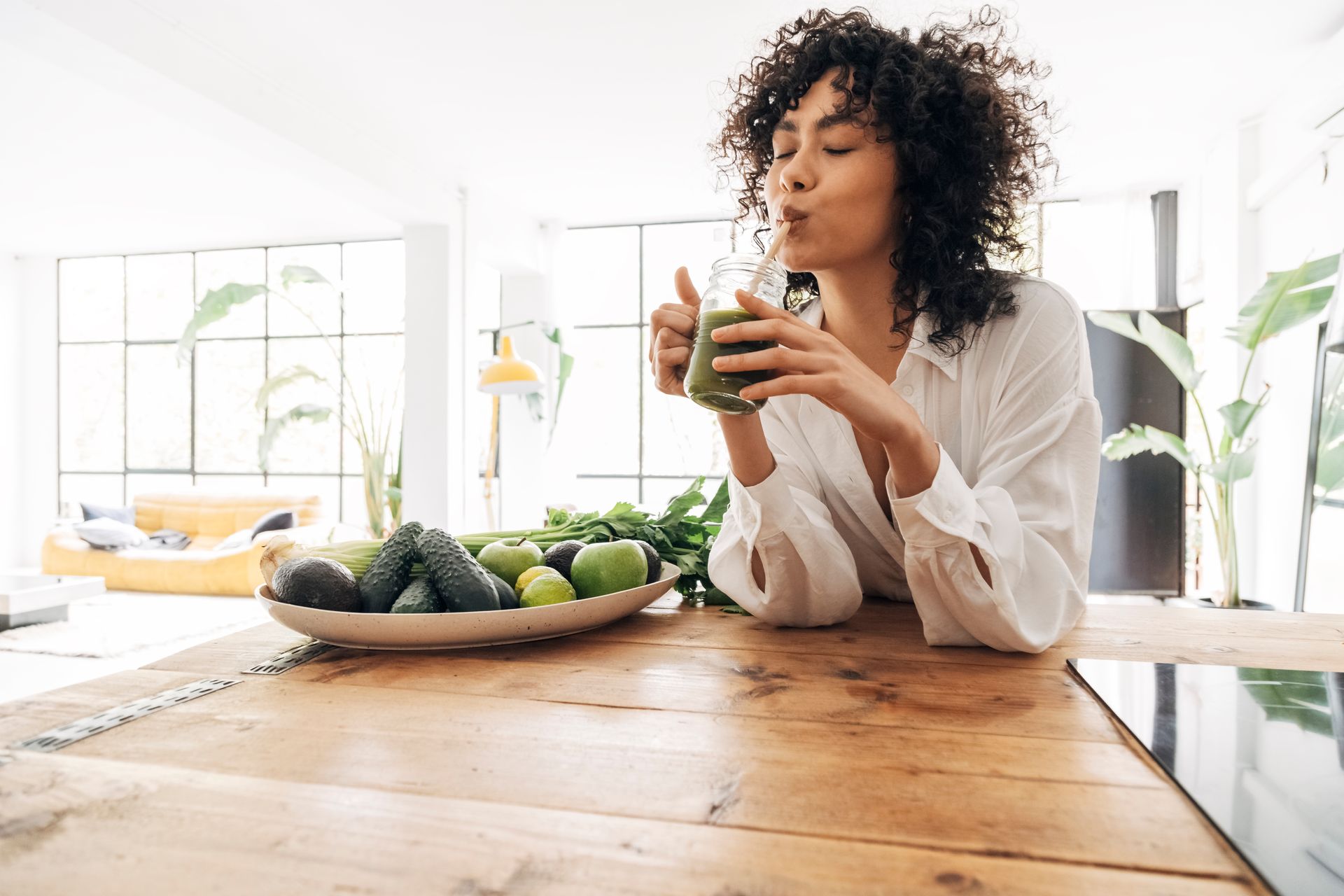Young african american woman drinking green juice with reusable bamboo straw in loft apartment. Home concept. Healthy lifestyle concept. Copy spaceContinue reading Young african american woman drinking green juice with reusable bamboo straw in loft apartment. Copy space
Have you ever met someone who thought that the best way to make a person happy was through their stomach?
Well, that person might have been on the right track!
Let’s talk more about how our gut and brain health are related!
Importance of Gut Health
Our gut, also known as the gastrointestinal tract, has its own independent, sophisticated nervous system. There are over 100 trillion bacteria, viruses, and fungi (aka the microbiome) that call it home — this is ten times the total number of human cells in our bodies! It is also referred to as our “second brain.”
Our gut bacteria work in harmony to help keep our bodies healthy and balanced. They do this by producing neurochemicals and hormones when they break down the foods we eat.
This process influences our brain’s neurons and regulates many human functions, from appetite to mood.
These healthy gut bacteria also help us create substances like vitamin K, a critical factor in regulating calcium levels in our blood.
While bacteria can sound like a bad thing, having a variety of healthy gut bacteria is actually very beneficial.
In fact, health problems occur when there is a shift towards a higher number of harmful gut bacteria (also known as dysbiosis). This shift can come from our foods, stress, pollution, and antibiotic use.
The Gut-Brain Link
Our gut and brain communicate through the vagus nerve, neurotransmitters, the hypothalamic-pituitary-adrenal (HPA) axis, hormones, and chemical mediators.
Our gut health is complex, and there are a lot of factors influencing it, including genetics and lifestyle factors.
Recently, twenty-one studies spanning ten countries were reviewed in a study evaluating the link between dietary patterns and mental health.
One of the main findings was that individuals with a high intake of fruits, vegetables, whole grains, fish, olive oil, and low-fat dairy plus a lower intake of animal foods had a reduced risk of depression.
Conversely, a higher risk of depression was associated with higher intakes of red or processed meat, refined grains, sweets, high-fat dairy products, butter, potatoes, and high-fat gravy, along with a low intake of fruits and vegetables.
The study ultimately suggested that we can improve our eating patterns to reduce our risk of depression.
Our Gut Health and Overall Health
There are many different reasons to take your gut health seriously.
Studies show that having healthy gut bacteria decreases symptoms of IBS, stress response, inflammation, anxiety, and chronic fatigue.
So how can you improve your gut health?
Some factors like genetics and environmental pollution are out of our control.
But the good news is that there are far more lifestyle factors that we can control and modify!
7 Steps to Improve our Gut Health:
1. Eat a balanced diet
Aim to eat a diet full of fruits, vegetables, whole grains, fish, olive oil, nuts and seeds, and low-fat dairy.
Eating more plant-based foods can help us get more fiber and essential vitamins and minerals.
2. Eat less of certain foods
Decrease intake of red or processed meat, refined grains, sweets, high-fat dairy products, butter, potatoes, and high-fat gravy.
Remember that these are no “bad” foods, simply foods we should be eating less frequently. When consumed in higher amounts, these foods can negatively shift the delicate bacteria balance in our gut.
3. Eat a variety of fruits and vegetables
Aim for a colorful plate full of fruits and vegetables throughout the day.
We have yet to be able to invent a multivitamin that replaces all of the good stuff found in fruits and vegetables, so fill up!
4. Log your food intake.
Using your Lose It! App can help monitor your fiber, vitamin, and mineral intake. Work to increase fiber from a wide variety of food sources.
The more variety we eat, the more likely we will give our microbiome what it needs to thrive.
5. Include fermented foods in your diet.
Enjoy fermented foods, including sauerkraut (refrigerated only), yogurt, kefir, kimchi (fermented cabbage), kombucha (fermented black tea), tempeh, and miso.
These foods have healthy gut bacteria from the fermentation process and are also packed full of prebiotics, or the foods necessary for gut bacteria to survive.
6. Get out in nature and get a little dirty.
In this great Ted Talk by Dr. Robynne Chutkan, she recommends that you eat clean and live a little dirty to help your gut bacteria flourish.
7. Take a probiotic if needed.
Choose a high-quality probiotic with multiple strains of bacteria.
I recommend choosing one with at least 1 billion units containing Lactobacillus, Bifidobacterium, or Saccharomyces Boulardii.
Many brands offer women’s specific, men’s, teens’, children’s, or mental health formulas.
The Bottom Line
What we eat affects not only our physical health but also our mental health.
By eating a diet rich in fruits, vegetables, whole grains, fish, and olive oil, we can boost our gut (and brains)!
And don’t forget to use your Lose It! app to help encourage more plant-based foods in your diet!

